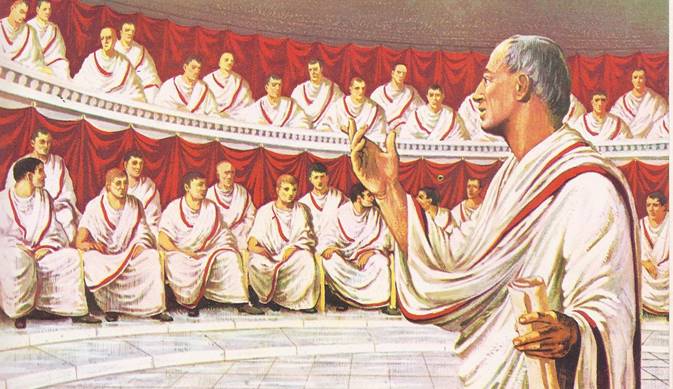MARCUS TULLIUS CICERO, a young statesman known for his dramatic speeches, stood before a panel of judges in a courtroom in Rome. He stared at them angrily. For fifty days he had travelled through Sicily, collecting facts about the crimes committed by Caius Verres, the man who was on trial. Now the judges had told him that there would not be time to listen to his evidence. Cicero knew that the judges had been bribed. For it was no ordinary criminal that he meant to send to prison or to death. Caius Verres was an aristocrat and a senator and had served for three years as the governor of the province of Sicily. Verres’ lawyer was Hortensius, the leader of the aristocrats. Indeed, every rich or important man in Rome seemed to be supporting Verres, but Cicero was determined that this man should not escape judgment. He turned to Hortensius and offered to present his case in one day. “Would the court have time enough for that?” ‘ he asked sarcastically. Hortensius was surprised, but he smiled and told Cicero to try it if he liked. The judges agreed. For a moment there was silence in the courtroom, as Cicero turned to face the benches where the long lines of judges sat. Sternly he looked from man to man until he was certain all their eyes were on him. Then he began to speak. He listed Verres’ crimes: When he was governor and the commander of Rome’s army in Sicily, he had taken for himself the money raised to pay the troops. When he was governor and responsible for order and justice in the province, he had taken more money to allow pirates to rob the ports, to set criminals free and to condemn innocent men. For gold, he had …
Read More »City of Romulus B. C. 900 – 256
In the time when savage warriors roamed the plains and mountains of Italy, there stood on six low hills, just south of the river Tiber, six clusters of round huts made of twigs and leaves stuck together with mud. Each was a little town, the home of barbarian tribesmen. They herded cattle on the plain below, chased the wild pigs in the woods and tried to make things grow in their marshy fields. Although the towns were always fighting or stealing cattle and sheep from each other, they shared a market place in a clearing beside the river. They also shared a crude fortress of heaped-up earth and rocks on a seventh hill. The huts on the hills, the market place, the fortress – this, about B. C. 900, a hundred years or so before the Etruscans came to Italy, was Rome. Then a powerful chief came to the place of the seven hills. When he had built a great hut of his own, on the widest of them, he called together the chiefs of the six towns. He told them that he planned to build a city on their hills and that their towns would all be parts of it. Whether the old chiefs agreed to the plan or not, it was done. On the day in April which was the feast day of Pales, the guardian god of herds and flocks, the new chief performed the solemn ritual of the founding of his city. With a bronze plow, drawn by a caw and a bull yoked together, he dug one furrow – a sacred line that marked the city’s boundaries, the place where its walls would be built. He traced the lines of two main streets – one running north and south, one east-and-west and crossing in the …
Read More »

